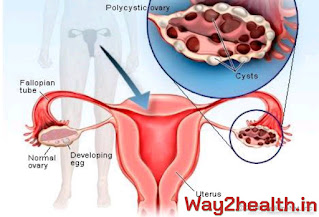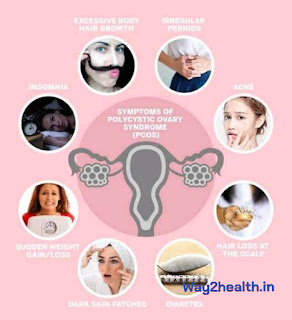Polycystic ovarian syndrome is a syndrome manifested by Amenorrhea, Hirsutism and Obesity associated with enlarged ovaries.
It is the most common endocrine disorder in a woman of reproductive age.
The Most common causes of Polycystic ovarian syndrome ( PCOS) are insulin resistance and Obesity.
Polycystic ovarian syndrome mainly leads to infertility due to excess production of male hormone and improper production of egg during fertilization.
There is no cure for Polycystic ovarian syndrome ( PCOS) but diet and lifestyle modification and some medication gives symptomatic relief.
- There is minor difference between Poly cystic ovarian syndrome ( PCOS ) and Polycystic ovarian disease (PCOD) but they both are associated with ovaries and leads to infertility.
- In PCOS testosterone levels increases and that affect healthy egg development and some immature egg produces cyst in ovaries.
- In PCOD egg develops properly but they are do not get discharged and stays in ovaries and leads to hormonal imbalances.
Causes :-
- Insulin resistance
- Hormonal imbalance ( Male hormone increases)
- Genetics
- Increased level of Inflammation
Symptoms :-
- Irregular menstruation
- Scanty or heavy menstruation
- Weight gain especially on belly fat
- Skin pigmentation on neck
- Acne on face and Back
- Irritability ( Mood Swings) , Anxiety
- Infertility
- Due to insulin resistance sometimes type 2 diabetes occurs.
- High level of blood cholesterol
- High blood pressure
Management :-
- First focus to manage Obesity, Menstrual cycle and Insulin level.
- Diet and lifestyle helps with symptomatic relief so focus on that.
Diet :-
- Drink more water.
- Take food every 3-4 hour intervals that helps to maintain sugar levels.
- Eat natural and unprocessed foods.
- Consume food which contains more fiber like Spinach, Dark and green leafy vegetables, Broccoli and cauliflower.
- Eat healthy fats that helps to control blood cholesterol levels like Olive oil, Avocados and coconuts Etc.
- Consume dried beans, lentils, legumes and fruits like Berries, Grapes, Cherry and many others.
- Avoid sugary food and saturated fats, junk foods.
- Avoid taking more salty and sour food during menstruation.
Lifestyle :-
- Manage your weight by doing exercise about 30-40 minutes daily and yoga that also helps to regulate menstruation and control insulin level.
- E.g. of Yoga Dhanurasana ( Bow pose), Utaanpadasana ( Raised leg pose),
Baddhakonasana ( Bound angle pose), Ustrasana ( Camel pose), Vajrasana ( Diamond pose), Vrikshasana ( Tree pose) and other.
- Do pranayama daily Anulomvilom pranayama, Bhramari pranayama.
- yoga and Pranayama helps to regulate menstrual cycle, keeps hormones in balance and manage stress and anxiety.
- Adopt Happy, Bright and positive view on life because living with gynaecological problems affect your confidence.
- Do meditation or do some activity which you like by this way you remain active through out the day and that helps to reduce stress and anxiety.
Note :- This Diet and lifestyle helpfull to give symptomatic relief but medication is also required for polycystic ovarian syndrome and sometimes to remove cyst Bariatric surgery is also required. So take consent of registered physician if you have symptoms of Polycystic ovarian Syndrome ( PCOS ).













0 Comments